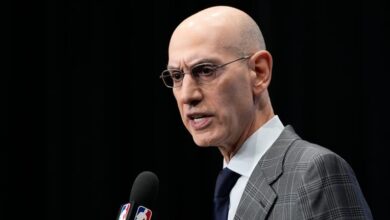New York Mayor Eric Adams’ corruption case dismissed by federal judge
A Manhattan federal judge dismissed the public corruption charges against New York City Mayor Eric Adams with prejudice, preventing the U.S. Department of Justice from bringing charges against him in the future.
The 78-page decision by U.S. District Court Judge Dale Ho caps a decade-long investigation into Adams, who was charged with soliciting foreign donations from Turkish business people and a public official since 2014, when he was still the Brooklyn borough president.
Federal prosecutors accused the mayor in September of laundering these alleged donations through straw donors so that he could qualify for millions of dollars in public matching funds through the city’s campaign finance program. Adams regularly sought free airfare and upgrades to first class from Turkish Airlines, prosecutors said, as his benefactors allegedly groomed him for municipal favors.
In 2021, after Adams had won the Democratic primary for mayor, all but clinching the elected office, Turkish officials allegedly called in their previous favors to get Adams to pressure FDNY officials to waive safety concerns and allow the 36-story Turkish embassy to open in midtown ahead of a visit from the country’s president, prosecutors said.
The dismissal also turns the page on a divisive internal battle between the U.S. Department of Justice and the U.S. Attorney’s Office for the Southern District of New York, often called the “Sovereign District” for its independence from Washington politics.
Despite federal authorities’ assertions that the case began in 2014, Adams said that he had been targeted by the Biden administration’s Department of Justice because of his criticism of the former president’s immigration policies.
“We allege that Mayor Adams abused that privilege and broke the law, laws that are designed to ensure that officials like him serve the people, not the highest bidder, not a foreign bidder, and certainly not a foreign power,” former U.S. Attorney Damian Williams said in his news conference announcing the indictment.
Adams pleaded not guilty and his lawyer, Alex Spiro, disparaged the case as politically motivated and built around conduct that did not amount to a crime.
“This case isn’t even a real case,” the defense attorney said after the arraignment. “This is the airline upgrade corruption case.”
Spiro, pointing to a landmark U.S. Supreme Court ruling on public corruption, has not disputed many of the central facts of the fraud and bribery case, but has referred to the free airfare and luxury hotel accommodations as “gratuities.”
Williams resigned as U.S. Attorney for the Southern District of New York after Trump took over and later wrote an opinion piece saying that there was an ethical crisis in city leadership.
Danielle Sassoon, the interim U.S. attorney for the district, continued to pursue the case and suggested that more charges would be forthcoming.
On Feb. 10, the Department of Justice hit the brakes on the case when Acting Deputy Attorney General Emil Bove ordered Sassoon request that the case would be dropped without prejudice, meaning that it could be retried in the future.
Bove, who represented Trump during the hush-money trial, said that though he had not reviewed the merits of the case, the prosecution of the New York City mayor interfered with his ability to fight crime and enforce the president’s border crackdown.
Bove also suggested that the case has been brought for political reasons and could be considered election interference, considering that the indictment came about eight months before the New York City Democratic primary for mayor.
The request stunned legal observers, former judges, defense attorneys and prosecutors.
New York Law professor and former Manhattan prosecutor Rebecca Roiphe said that it amounted to extortion.
Sassoon refused the dismissal request and in her resignation letter said that she believed the mayor and the Department of Justice had made an unethical quid quo pro deal, that Adams would support Trump’s migrant deportation effort in exchange for being cleared of his charges.
She also reaffirmed her belief in the case.
“I am confident that Adams has committed the crimes with which he is charged, I cannot agree to seek a dismissal driven by improper considerations,” Sassoon wrote to Attorney General Pam Bondi.
Seven attorneys, including Hagan Scotten, the lead prosecutor on the case resigned rather than carry out Bove’s order.
“But any assistant U.S. attorney would know that our laws and traditions do not allow using the prosecutorial power to influence other citizens, much less elected officials, in this way,” Scotten wrote in his resignation letter. “If no lawyer within earshot of the President is willing to give him that advice, then I expect you will eventually find someone who is enough of a fool, or enough of a coward, to file your motion. But it was never going to be me.”
Bove accepted all the resignations and moved the case to D.C.
Throughout the case, Adams’ political support in the city eroded.
Ho delayed his decision on the Department of Justice request, assigning Paul Clement, a well-respected Republican attorney and former solicitor general under President George W. Bush, to review it and inform the judge of his options outside rubber-stamping the dismissal.
On March 7, Clement weighed in, saying that the federal rules of criminal procedure do not allow a judge to force prosecutors to continue a case. Ho, he said, had two options: dismiss the case with prejudice or dismiss the case without prejudice.
Clement argued that only dismissing the case with prejudice — preventing prosecutors from charging Adams for the same crimes again — would be the correct thing to do.
A Manhattan federal judge dismissed the public corruption charges against New York City Mayor Eric Adams with prejudice, preventing the U.S. Department of Justice from bringing charges against him in the future.
The 78-page decision by U.S. District Court Judge Dale Ho caps a decade-long investigation into Adams, who was charged with soliciting foreign donations from Turkish business people and a public official since 2014, when he was still the Brooklyn borough president.
Federal prosecutors accused the mayor in September of laundering these alleged donations through straw donors so that he could qualify for millions of dollars in public matching funds through the city’s campaign finance program. Adams regularly sought free airfare and upgrades to first class from Turkish Airlines, prosecutors said, as his benefactors allegedly groomed him for municipal favors.
In 2021, after Adams had won the Democratic primary for mayor, all but clinching the elected office, Turkish officials allegedly called in their previous favors to get Adams to pressure FDNY officials to waive safety concerns and allow the 36-story Turkish embassy to open in midtown ahead of a visit from the country’s president, prosecutors said.
The dismissal also turns the page on a divisive internal battle between the U.S. Department of Justice and the U.S. Attorney’s Office for the Southern District of New York, often called the “Sovereign District” for its independence from Washington politics.
Despite federal authorities’ assertions that the case began in 2014, Adams said that he had been targeted by the Biden administration’s Department of Justice because of his criticism of the former president’s immigration policies.
“We allege that Mayor Adams abused that privilege and broke the law, laws that are designed to ensure that officials like him serve the people, not the highest bidder, not a foreign bidder, and certainly not a foreign power,” former U.S. Attorney Damian Williams said in his news conference announcing the indictment.
Adams pleaded not guilty and his lawyer, Alex Spiro, disparaged the case as politically motivated and built around conduct that did not amount to a crime.
“This case isn’t even a real case,” the defense attorney said after the arraignment. “This is the airline upgrade corruption case.”
Spiro, pointing to a landmark U.S. Supreme Court ruling on public corruption, has not disputed many of the central facts of the fraud and bribery case, but has referred to the free airfare and luxury hotel accommodations as “gratuities.”
Williams resigned as U.S. Attorney for the Southern District of New York after Trump took over and later wrote an opinion piece saying that there was an ethical crisis in city leadership.
Danielle Sassoon, the interim U.S. attorney for the district, continued to pursue the case and suggested that more charges would be forthcoming.
On Feb. 10, the Department of Justice hit the brakes on the case when Acting Deputy Attorney General Emil Bove ordered Sassoon request that the case would be dropped without prejudice, meaning that it could be retried in the future.
Bove, who represented Trump during the hush-money trial, said that though he had not reviewed the merits of the case, the prosecution of the New York City mayor interfered with his ability to fight crime and enforce the president’s border crackdown.
Bove also suggested that the case has been brought for political reasons and could be considered election interference, considering that the indictment came about eight months before the New York City Democratic primary for mayor.
The request stunned legal observers, former judges, defense attorneys and prosecutors.
New York Law professor and former Manhattan prosecutor Rebecca Roiphe said that it amounted to extortion.
Sassoon refused the dismissal request and in her resignation letter said that she believed the mayor and the Department of Justice had made an unethical quid quo pro deal, that Adams would support Trump’s migrant deportation effort in exchange for being cleared of his charges.
She also reaffirmed her belief in the case.
“I am confident that Adams has committed the crimes with which he is charged, I cannot agree to seek a dismissal driven by improper considerations,” Sassoon wrote to Attorney General Pam Bondi.
Seven attorneys, including Hagan Scotten, the lead prosecutor on the case resigned rather than carry out Bove’s order.
“But any assistant U.S. attorney would know that our laws and traditions do not allow using the prosecutorial power to influence other citizens, much less elected officials, in this way,” Scotten wrote in his resignation letter. “If no lawyer within earshot of the President is willing to give him that advice, then I expect you will eventually find someone who is enough of a fool, or enough of a coward, to file your motion. But it was never going to be me.”
Bove accepted all the resignations and moved the case to D.C.
Throughout the case, Adams’ political support in the city eroded.
Ho delayed his decision on the Department of Justice request, assigning Paul Clement, a well-respected Republican attorney and former solicitor general under President George W. Bush, to review it and inform the judge of his options outside rubber-stamping the dismissal.
On March 7, Clement weighed in, saying that the federal rules of criminal procedure do not allow a judge to force prosecutors to continue a case. Ho, he said, had two options: dismiss the case with prejudice or dismiss the case without prejudice.
Clement argued that only dismissing the case with prejudice — preventing prosecutors from charging Adams for the same crimes again — would be the correct thing to do.
Source link



